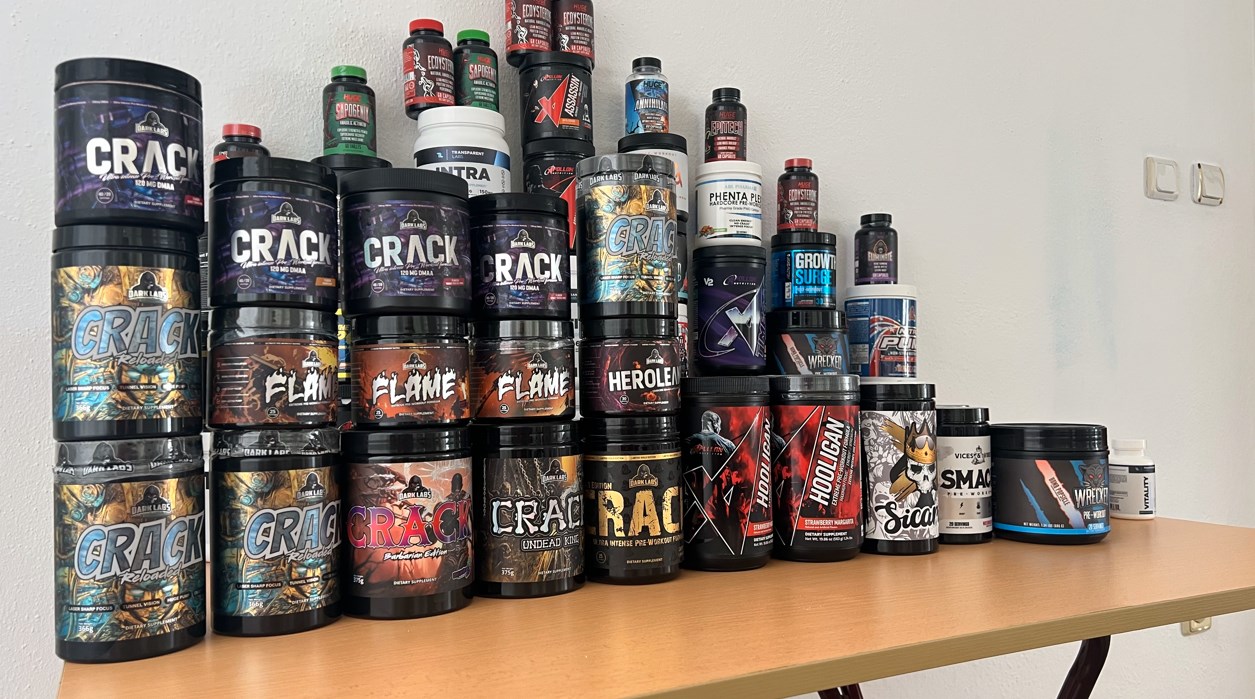
As you're reading this...
You might be sipping on your trusted pre-workout supplement.
But the thought crossed your mind...
"Can this pre-workout kill me?"
Or maybe you've just stopped and wondered the question the potential risks.
Regardless, you've probably come across news of someone who tragically died from either energy drinks, caffeine, or a pre-workout.
In this article, we break into the question: "Can pre-workout kill you?" and answer it in detail.
Yes, pre-workouts can potentially be fatal, but such instances are extremely rare and usually result from misuse or overconsumption.
Pre-workout supplements, especially those high in stimulants like caffeine, can lead to serious health issues such as heart arrhythmias, seizures, and in extreme cases, death.
It's crucial to use these supplements responsibly, follow the manufacturer's dosage instructions, and consult with a healthcare professional if you have any concerns.

Pre-workout is a type of dietary supplement designed to supercharge your workouts.
It's typically consumed before exercise and is packed with ingredients intended to increase your energy, improve your endurance, and enhance your focus.
Common ingredients in pre-workout supplements include caffeine for a quick energy boost, amino acids like beta-alanine to help buffer acid in your muscles, and creatine to aid in high-intensity workouts.
Some pre-workouts also contain nitric oxide precursors like agmatine and L-citrulline, which are believed to help increase blood flow to your muscles during exercise.
The Benefits of Pre-Workout
The allure of pre-workout supplements lies in their promised benefits.
These benefits are designed to help you push past your limits and achieve your fitness goals.
Increased Energy: The caffeine in pre-workout supplements acts as a stimulant, giving you a burst of energy to power through your workout.
Improved Endurance: Ingredients like beta-alanine can help delay muscle fatigue, allowing you to work out for longer periods.
Enhanced Focus: Some pre-workouts contain ingredients that are meant to improve cognitive function, helping you stay focused and motivated during your workout.
These benefits aren't just marketing hype.
Numerous scientific studies support the effectiveness of pre-workout supplements.
For instance, a study published in the Journal of the International Society of Sports Nutrition found that pre-workout supplements could significantly improve anaerobic peak and mean power values in trained individuals.
Now, let's address the elephant in the room:
Can pre-workout kill you?
The answer is not straightforward.
While pre-workout supplements are generally safe for most people when used correctly, they can pose serious health risks if misused.
Several real-life incidents highlight the potential dangers of pre-workout supplements.
For example, a healthy 29-year-old man tragically died from caffeine toxicity after consuming a pre-workout supplement.
He had ingested a powder that contained a high concentration of caffeine, equivalent to hundreds of cups of coffee.

Pre-workouts are a popular supplement among fitness enthusiasts for their ability to enhance performance and endurance.
However, like any supplement, they come with a set of potential side effects.
These can range from mild to severe, depending on the individual's health status, the amount consumed, and the specific ingredients in the supplement.
Increased Heart Rate and Blood Pressure: Many pre-workouts contain stimulants like caffeine, which can increase heart rate and blood pressure. While this might boost performance in the short term, it can also put a strain on the cardiovascular system, especially in individuals with pre-existing heart conditions. [1]
Insomnia: The stimulants in pre-workouts can interfere with sleep if taken later in the day. Poor sleep can negatively impact recovery and overall health. [2]
Digestive Issues: Some people may experience stomach upset, diarrhea, or constipation from certain ingredients in pre-workouts. [3]
Dehydration: Ingredients like caffeine can have a diuretic effect, leading to increased urine output and potential dehydration if fluid intake is not adequately increased. [4]
Mood Changes: Some users report feelings of anxiety, jitteriness, or mood swings after taking pre-workouts. [5]
Pre-workout supplements, while beneficial for enhancing workout performance, can pose serious health risks if misused or overconsumed.
Here are some reasons why pre-workout could potentially cause death:
Excessive Caffeine Intake: Many pre-workout supplements contain high levels of caffeine to boost energy. However, consuming too much caffeine can lead to caffeine toxicity, which can cause serious health issues such as heart arrhythmias, seizures, and in extreme cases, death. According to a study published in the Journal of Caffeine Research, caffeine toxicity can occur at levels higher than 400 mg per day in some individuals. [6]
Undiagnosed Heart Conditions: Individuals with undiagnosed heart conditions may be at a higher risk when consuming pre-workout supplements, especially those high in stimulants. These supplements can increase heart rate and blood pressure, potentially leading to heart attacks or strokes. The American Heart Association warns that stimulants can trigger arrhythmias in susceptible individuals. [7]
Interactions with Other Substances: Pre-workout supplements can interact negatively with other substances such as prescription medications, alcohol, or illicit drugs. These interactions can exacerbate the effects of the supplement and lead to dangerous health outcomes. The U.S. Food and Drug Administration (FDA) advises consumers to be aware of potential interactions between supplements and medications. [8]
Overdose of Other Ingredients: Besides caffeine, pre-workout supplements often contain a mix of other ingredients like amino acids, creatine, and beta-alanine. Overconsumption of these substances can lead to health issues such as kidney damage, gastrointestinal distress, and tingling or numbing sensations. A report in the Journal of the International Society of Sports Nutrition highlights potential risks associated with excessive creatine intake. [9]
Improper Use: Misuse of pre-workout supplements, such as taking more than the recommended dose, using them for prolonged periods, or combining them with other stimulant-based products, can increase the risk of adverse effects and potentially life-threatening situations. The National Institutes of Health (NIH) recommends using dietary supplements responsibly and under the guidance of a healthcare provider. [10]
Remember, while pre-workout supplements can enhance your workouts, they should be used responsibly and as part of a balanced fitness approach.
While death from pre-workout supplements is rare, it's important to understand how it can occur.
Here are some potential ways:
Cardiac Arrest: High doses of stimulants can lead to a rapid or irregular heartbeat, potentially resulting in cardiac arrest. [11]
Stroke: Elevated blood pressure from stimulants can increase the risk of a stroke. [12]
Seizures: Some pre-workout supplements have been linked to seizures, likely due to the overstimulation of the nervous system. [13]
Liver Damage: Certain ingredients in pre-workouts, when taken in large amounts, can cause liver damage. [14]
Overdose: Consuming extremely high doses of pre-workouts can lead to an overdose, with symptoms ranging from mild (nausea, dizziness) to severe (unconsciousness, death). [15]
Always consult with a healthcare professional before starting any new supplement.
If you've taken a pre-workout and are feeling overly stimulated, there are several strategies you can employ to help calm down:
Hydrate: Drink plenty of water to help your body process the pre-workout more quickly.
Deep Breathing: Deep, controlled breathing can help slow your heart rate and calm your nervous system.
Light Exercise: Engaging in a light exercise like walking can help your body metabolize the pre-workout faster.
Avoid Stimulants: Try to avoid any additional sources of caffeine or other stimulants.
Consult a Healthcare Professional: If your symptoms are severe or persist for a long time, it may be necessary to seek medical attention.
It's important to remember that you can always assess your tolerance before taking a full serving of pre-workout.
You can always take more, but you can never take less.

When it comes to pre-workout supplements, the key to reaping the benefits without risking your health lies in safe and responsible usage.
Here are some guidelines to keep in mind:
Follow the Recommended Dosage: Always adhere to the manufacturer's recommended dosage. More is not always better, especially when it comes to stimulants like caffeine.
Listen to Your Body: Pay attention to how your body reacts to the supplement. If you experience adverse effects like rapid heartbeat, extreme restlessness, or insomnia, it might be a sign that you're taking too much.
Consider Your Tolerance: Everyone's tolerance to stimulants is different. If you're sensitive to caffeine, look for pre-workout supplements with lower caffeine content.
Consult a Healthcare Professional: If you have any underlying health conditions or if you're taking any other medications, it's always a good idea to consult a healthcare professional before starting any new supplement regimen.
Remember, pre-workout supplements are not a magic bullet for fitness success.
They're tools that, when used correctly, can enhance your workouts.
But they're not a substitute for a balanced diet, regular exercise, and adequate rest.
Alternatives to Pre-Workout Supplements
If you're concerned about the potential risks associated with pre-workout supplements, there are natural alternatives you can consider.
These alternatives can offer similar benefits without the potential side effects of pre-workout supplements.
Coffee: A cup of black coffee can give you a caffeine boost to energize your workout.
Green Tea: Green tea contains caffeine and is rich in antioxidants, making it a great pre-workout drink.
Whole Foods: Foods like bananas, oats, and almonds can provide the energy you need for your workout.
Hydration: Staying hydrated is crucial for optimal workout performance. Water is always a good choice, but you can also opt for coconut water, which provides electrolytes.

How much caffeine is too much in a pre-workout supplement?
The amount of caffeine that's considered safe can vary depending on your tolerance and body weight.
However, most sources agree that up to 400 mg of caffeine per day is safe for most healthy adults.
Many pre-workout supplements contain between 150-300 mg per serving.
Can I take pre-workout supplements every day?
While it's generally safe to take pre-workout supplements on the days you exercise, taking them every day (especially those containing stimulants like caffeine) can lead to tolerance, meaning you'll need to take more to get the same effect.
It can also lead to side effects like restlessness, anxiety, and sleep disturbances.
What should I do if I experience side effects from a pre-workout supplement?
If you experience side effects like rapid heartbeat, extreme restlessness, or insomnia after taking a pre-workout supplement, it's a good idea to stop taking the supplement and consult a healthcare professional.
Are all pre-workout supplements dangerous?
No, not all pre-workout supplements are dangerous.
However, like any dietary supplement, they should be used responsibly.
Always follow the manufacturer's instructions, and consult with a healthcare professional if you have any concerns.
Can I build a tolerance to pre-workout supplements?
Yes, it's possible to build a tolerance to pre-workout supplements, especially those that contain stimulants like caffeine.
If you find that you need to take more of the supplement to achieve the same effects, it may be a sign that you've developed a tolerance.
Can I mix different pre-workout supplements?
Mixing different pre-workout supplements is not recommended without the guidance of a healthcare professional.
Different supplements can contain varying amounts of ingredients, and combining them could lead to overconsumption of certain substances.
Are there any natural alternatives to pre-workout supplements?
Yes, there are natural alternatives to pre-workout supplements.
Foods like bananas, oats, and almonds can provide energy for your workout.
Hydrating with water or coconut water can also help enhance your performance.
How can I safely reduce my use of pre-workout supplements?
If you're looking to reduce your use of pre-workout supplements, it's a good idea to do so gradually rather than stopping abruptly.
You might start by reducing the amount you take each time, or by using the supplement less frequently.
If you need help, consider consulting with a healthcare professional.

Just like any other product, pre-workout supplements have a shelf life.
But what happens when they go past their expiration date?
Can pre-workouts go bad?
The answer is yes, pre-workout supplements can go bad over time, especially if not stored correctly.
When pre-workouts go bad, they may lose their potency, meaning they won't be as effective as they once were.
In some cases, they might even develop mold or bacteria, which can be harmful if ingested.
To ensure your pre-workout supplement stays fresh and effective for as long as possible, it's important to store it in a cool, dry place and keep it tightly sealed when not in use.
For more information on this topic, check out this article.
While pre-workout supplements can be beneficial for adults, they may not be suitable for all age groups.
Specifically, teens might want to think twice before reaching for these supplements.
The high caffeine content found in many pre-workouts can be too much for younger individuals, potentially leading to adverse effects like restlessness, anxiety, and sleep disturbances.
Moreover, teens are still growing and developing, and the long-term effects of pre-workout supplements on this demographic are not fully understood.
As such, it's generally recommended that teens focus on getting their nutrients from a balanced diet rather than supplements.
For a more in-depth discussion on pre-workouts and teens, you can read this article.
While pre-workout supplements can boost your workout performance, not all ingredients are created equal.
Some ingredients can cause unwanted side effects or may not be as beneficial as they seem.
For instance, proprietary blends (where the specific amounts of each ingredient are not disclosed) can make it difficult to know exactly what you're getting.
Other ingredients to be wary of include excessive amounts of caffeine, artificial sweeteners, and certain stimulants like yohimbe, which can cause side effects like rapid heart rate and high blood pressure.
For a comprehensive list of pre-workout ingredients to avoid, check out this article.
Remember, the key to safely using pre-workout supplements is to understand what you're putting into your body.
Always read the label, do your research, and consult with a healthcare professional if you have any concerns.

The world of pre-workout supplements is complex, filled with both potential benefits and risks.
As we've seen, the key to navigating this world is informed decision-making.
Here's what you should take home with this article:
Pre-workout supplements can be a game-changer for performance and health, but they can come at a cost.
While they can enhance your workouts, they should be used responsibly.
Never take more than what you can handle and always assess your tolerance.
Your health is your wealth, so make informed decisions and keep pushing toward your fitness goals
Useful Links
 About FitFrek
About FitFrekFitFrek operates as an independent platform, offering comprehensive workouts, programs, routines, guides, and unbiased reviews to accelerate your progress. We pride ourselves on our honesty, delivering straightforward and candid insights. FitFrek does not offer medical advice, diagnosis, or treatment services.
Session expired
Please log in again. The login page will open in a new tab. After logging in you can close it and return to this page.